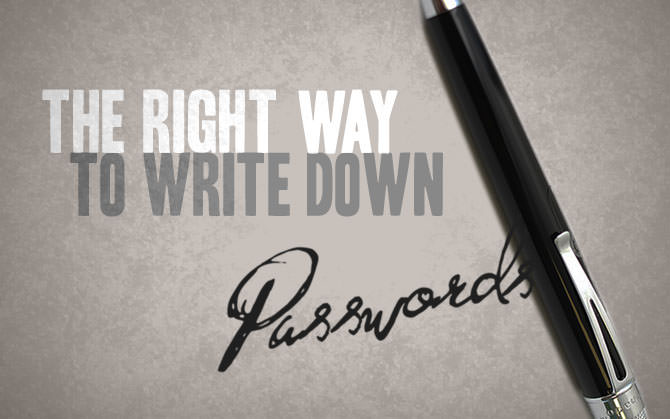This week I was helping one of our clients with a website that wasn’t loading correctly. “Can you log in for me?” I asked, knowing exactly what would happen next. Sure enough, she opened her desk drawer and pulled out a notebook chock full of usernames and passwords.
This is hardly uncommon. At least 70% of our clients are “secretly” storing a treasure trove of passwords this way. And I don’t blame them. Remembering all those passwords is a real pain. But there’s a better way.
Breaking the Rules
I don’t like to tell people to write down passwords. Because what gets written down will, at some point, be out of your control. That’s just the way it works. Not to mention the extremely high probability of losing the notebook entirely.
That’s why I recommend that people use a password manager like LastPass or 1Password. But that’s not always possible. Like at work or somewhere else where you can’t install things on your computer.
So there are some circumstances when you may need to break this rule and write them down anyway. Let’s look at some ways to make this practice a little safer.
How To Write Down Passwords the Right Way
Lock it up or keep it on you
Best scenario, you have somewhere to lock it up like a drawer or better yet, a safe. If not, keep it on your person. In a purse or wallet. To keep it manageable, find a tiny notebook or use a folded scrap of paper. Whatever you do, keep it under your control at all times.
Don’t write the usernames down
Never include any usernames with the passwords. This is very important. If you do, and someone finds your list on the sidewalk or steals your wallet, they’ll have all the information they need to get into your accounts. Luckily, the usernames should be easy to remember since they’re mostly just your email address.
Don’t write what they’re for
Should anyone find your list, you want to give them as little information as possible. For the most important passwords, don’t write down what they’re used for. Avoid labeling them “Bank Account” or “Email” for instance. If it helps, write them in a certain order, like your email first, bank account second, etc, so it’s easier to remember.
This, of course, probably won’t work for all of them, since you may have lots of them written down. So for the less-important passwords, feel free to write down what they’re for. Just remember not to include their usernames since that will give away who the list belongs to.
Change them slightly
This may be the best thing you can do. Develop a system for slightly modifying your passwords as you write them down. For example, change or remove the third and fifth characters. Or add one character to the beginning and three to the end of each password (just make sure they’re different for each password or else the pattern is easy to spot).
That way your actual password is never written down. Then when you refer to the list, you’ll be able to easily reconstruct them while onlookers won’t have a clue.
Related Articles

